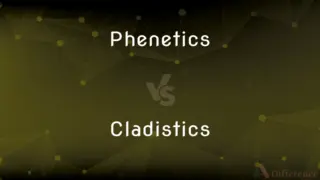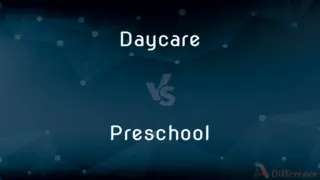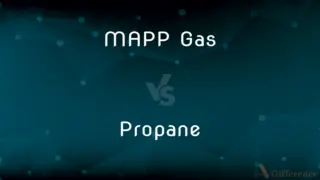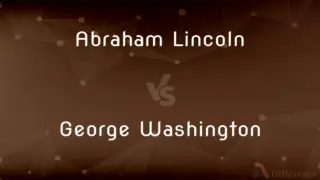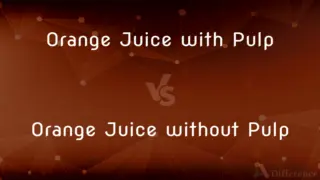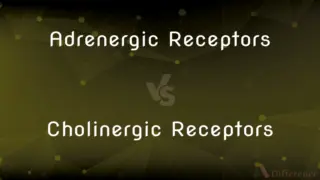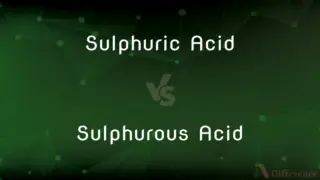Hurray vs. Hooray — What's the Difference?
By Maham Liaqat & Urooj Arif — Updated on April 26, 2024
"Hurray" and "hooray" are both interjections used to express joy or approval, but "hooray" is the more commonly accepted spelling in modern English.

Difference Between Hurray and Hooray
Table of Contents
ADVERTISEMENT
Key Differences
"Hurray" is often seen as a variant spelling of "hooray," both used to express excitement or enthusiasm. Typically, these expressions are shouted or exclaimed during moments of celebration or victory. On the other hand, "hooray" is generally the preferred form in contemporary usage, more frequently appearing in written and spoken English.
Both "hurray" and "hooray" are used in similar contexts, such as at sports events, celebrations, or in response to good news. While "hooray" might be more common in literary and formal settings, "hurray" still retains usage among various English speakers, illustrating a regional or stylistic preference.
The pronunciation of "hurray" and "hooray" is identical, making them phonetically indistinguishable. This similarity explains why both forms persist, as the choice between them often comes down to personal or regional spelling preferences rather than differences in meaning or usage.
In terms of historical usage, "hooray" might edge out "hurray" in terms of age and original adoption into English. Over time, variations like "hurray" emerged, but "hooray" has remained the standard spelling in most dictionaries and guides to contemporary English.
Despite their spelling differences, both "hurray" and "hooray" serve as positive reinforcements. They are frequently used to create a sense of camaraderie and shared joy, whether in writing or speech, emphasizing their function over form in communication.
ADVERTISEMENT
Comparison Chart
Spelling Variation
Less common variant.
More commonly accepted and used spelling.
Usage
Used in similar joyful or approving contexts as hooray.
Predominantly used in formal and literary contexts.
Pronunciation
Identical to hooray.
Identical to hurray.
Historical Presence
Slightly less historical usage compared to hooray.
Older and more traditional spelling in English.
Regional Preference
May appear more frequently in certain dialects or regions.
Widely recognized and used internationally.
Compare with Definitions
Hurray
Shouted to express relief or happiness at an event's successful outcome.
Hurray, the exam is finally over!
Hooray
Used to celebrate a victory or an accomplishment.
Hooray, we finished the project on time!
Hurray
An exclamation used to express joy, approval, or encouragement.
Hurray! We won the championship game!
Hooray
Commonly heard in crowds during celebrations or gatherings.
Hooray for our team!
Hurray
Sometimes used to cheer someone on.
Hurray, you can do it!
Hooray
Exclaimed in moments of personal or collective triumph.
Hooray, we’re going on vacation!
Hurray
Used to rally enthusiasm among a group.
Hurray, let’s get this project started!
Hooray
An exclamation of joy, triumph, or enthusiasm.
Hooray! She said yes to the proposal!
Hurray
Expressed in celebrations or festive occasions.
Hurray for the newlyweds!
Hooray
Often used to encourage or cheer people.
Hooray, keep pushing forward!
Hurray
Used as an exclamation of pleasure, approval, elation, or victory.
Hooray
From the old Norse battle cry "Huer Av", meaning "Heads Off".
Hurray
Variants of hooray.
Hooray
Used as an exclamation of pleasure, approval, elation, or victory.
Hurray
A shout of "hooray."
Hooray
A shout of "hooray."
Hurray
Excitement; fanfare.
Hooray
Excitement; fanfare.
Hurray
To applaud, cheer, or approve (someone or something) by shouting "hooray."
Hooray
To applaud, cheer, or approve (someone or something) by shouting "hooray."
Hurray
To shout "hooray."
Hooray
To shout "hooray."
Hurray
Alternative form of hooray.
Hooray
Used to express approval, joy or victory.
Lizzie has broken a world record, and she is now an Olympic medallist! – Hooray!
Hurray
(ambitransitive) To cheer with a "hurray".
Hooray
A shout to signify victory.
Hooray
An expression of excitement.
Hooray
To shout an expression of excitement.
Hooray
A victory cheer;
Let's give the team a big hurrah
Common Curiosities
Which spelling should I use when writing?
"Hooray" is more commonly recommended, especially in formal writing.
Can these words be used in professional settings?
While typically more casual, they can be appropriate in professional settings during celebrations or team-building events.
Is one spelling more modern than the other?
"Hooray" is often viewed as the more contemporary or standard spelling.
How can I teach kids to use these expressions appropriately?
Teach through examples, such as during games or when celebrating small achievements.
Are there any variations in pronunciation between the two?
No, both are pronounced the same way.
Is there any difference in meaning between hurray and hooray?
No, both terms share the same meanings and are used interchangeably.
Why do both spellings exist if they mean the same thing?
Variations often emerge in language due to regional differences, personal preferences, or historical spelling reforms.
Do these words have equivalents in other languages?
Yes, many languages have their own versions of such exclamations.
What impact does using such words have on communication?
They can add emotion or emphasis, enhancing the expression of joy or approval.
What is the origin of these exclamations?
Both derive from similar roots in older English and other European languages, historically used to express hailing or encouragement.
What is the best context to use these words?
Best used during moments of celebration, joy, or as a form of cheer.
Can hurray or hooray be used sarcastically?
Yes, depending on tone and context, they can convey sarcasm.
How often are these words used in literature?
They appear frequently in dialogues or narratives involving celebration or excitement.
Are there any popular cultural references that use these words?
Yes, these exclamations appear in various songs, movies, and books, often in celebratory scenes.
Is "hooray" considered informal?
Yes, it is generally considered informal and best used in casual communication or festive contexts.
Share Your Discovery

Previous Comparison
Heredity vs. Inheritance
Next Comparison
Downstage vs. UpstageAuthor Spotlight
Written by
Maham LiaqatCo-written by
Urooj ArifUrooj is a skilled content writer at Ask Difference, known for her exceptional ability to simplify complex topics into engaging and informative content. With a passion for research and a flair for clear, concise writing, she consistently delivers articles that resonate with our diverse audience.














